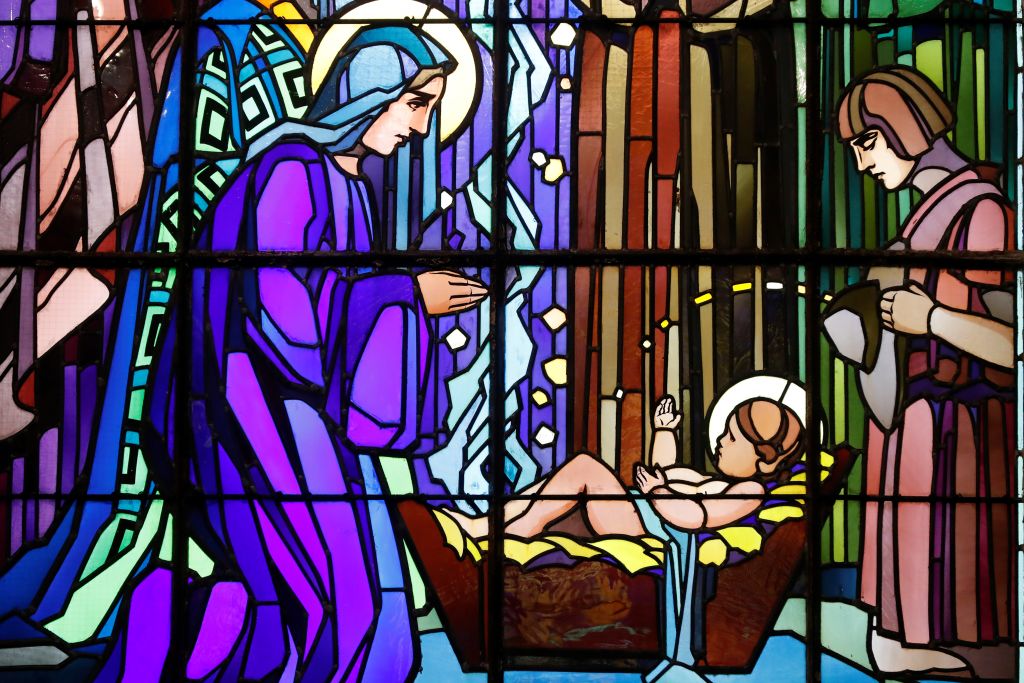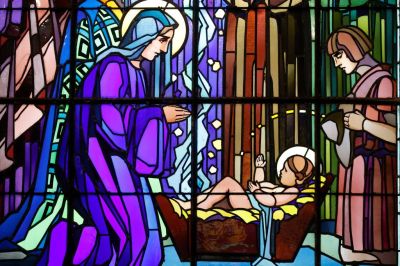At a rally last Saturday, now-candidate Donald Trump continued his claims that the 2020 election was rigged. But this time, he upped the ante, extending his call for electoral accountability to the divine: “I think if you had a real election and Jesus came down and God came down and said, ‘I’m gonna be the scorekeeper here,’ I think we’d win [in California], I think we’d win in Illinois, and I think we’d win in New York.” And with these words, the former president, even if unwittingly, expressed the core sentiment of Advent.
To be certain, Trump’s call for God to come in judgment is curious coming for someone currently under indictment for election fraud and a litany of other crimes. But even as the “Great Lie” has been consistently debunked, it continues to find purchase, in part, because it taps into our larger distrust of government. But that’s also what makes the timing of Trump’s statement so ironic. Advent, the four weeks before Christmas, is the season when Christians prepare to observe the time God did come down to earth. While modern celebrations act as a kind of joyous “soft open” for Christmas Day, Advent has historically been a time of contrition and contemplation of the human condition—including the injustice that marks human society. In this way, Advent asks us to consider all that’s wrong with the world as a means of cultivating our desire for justice.
In much the same way, Trumpian rhetoric resonates with the desire for government accountability—even if his version of accountability is unfounded. Trump’s 2016 promise to “drain the swamp” caught on only because people believed there was swamp to drain. Curiously, as well, Trump’s desire is not for divine intervention. He’s not calling for God to interrupt the political process or praying for a miracle that would somehow allow him to be president again. He’s claiming God’s authority as a just judge.
But MAGA voters are not the only ones calling for accountability. Earlier this year, progressive voices pressed the Senate to enact a legally binding code of conduct for the Supreme Court in light of recent revelations that Justices Clarence Thomas and Samuel Alito failed to disclose luxury trips.
Our shared loss of trust in government conflicts with our sense of identity and history. After all, the United States began as a protest against unjust rule. Ours was the system that supposedly would halt abuse of power and authoritarianism. Through the miracle of checks and balances, the three branches of government would hold each other accountable. But increasingly we find that our system isn’t working the way we thought it would. We struggle to hold leaders to account. Distribution of power sometimes means the distribution of corruption. This gap between what is and what should be has the potential to undermine the American soul and destroy our imagination for a shared future.
If the game is rigged, why play it?
To be fair to the American electorate, our present cynicism is not completely unfounded. As loyalty to party becomes assumed, so too is our fundamental distrust of those outside the party. We struggle to identify the difference between political position and personal character. In a 2022 Pew survey, 63 percent of Democrats said they view Republicans as immoral while 72 percent of Republicans see Democrats as such. Worse, while we believe the worst of our ideological and political opponents we give our friends passes. Despite clear and compelling evidence of former Rep. George Santos’ guilt, 112 of his fellow Republican party members voted against expelling him from the House. It seems that corruption can go unchecked as long as someone has the right letter beside their name.
At the same time, the digital age makes us increasingly aware of corruption. What in the past could be hidden in a smoky back room is now exposed, one anonymous airdrop at a time. So much so that it’s hard to know whether this moment in history is more corrupt than previous ones or whether we simply know about the corruption. Regardless, when our knowledge of the corruption grows, so too does our longing for someone, somewhere, somehow to hold leaders accountable.
Complicating matters even further, our established mechanisms of accountability can’t keep up. They’re often outdated or dependent on social and political norms that no longer exist. It’s long been assumed that the Supreme Court did not need an explicit code of conduct because justices would conduct themselves by professional ethics. In fact, the court recently issued a code of conduct based on this very assumption: The Senate did not need to regulate the court because it would regulate itself. But what happens when ethical norms themselves decay—when we can no longer assume that elected (or appointed) leaders will conduct themselves with dignity and integrity? What happens when we become impervious to shame?
The grim reality is that outside the ballot box, the American public lacks the mechanisms to hold our leaders in check. We are increasingly aware of corruption while also increasingly unable to do anything about it. We see abuses but do not see meaningful accountability. We’re overwhelmed and often feel helpless. You can understand that when a messiah-like figure comes along promising to restore “law and order” and to hold leaders accountable, it meets a deep emotional and psychological need. And I would contend, a spiritual one.
Left unaddressed, our helplessness in the face of corruption will lead to hopelessness. And this risk is greater than the risk of corruption itself. When we lose the hope of meaningful accountability, we lose hope in the system and in each other. We lose the very hope on which the American experiment rests: that we could together imagine and build a society where all could pursue our God-given right to life and liberty—regardless of whether we walk the halls of Congress or toil in our daily work, far from the centers of power and notoriety.
But this brings us back to Advent. Given the human condition, we will never eradicate government corruption. To riff off the words of Jesus, “The corrupt you will have with you always.” At the same time, however, there’s something spiritually formative about resisting corruption. When we name injustice, we remind ourselves and each other of what should be. We declare who we are as a people and what we are willing to accept.
But I believe that there’s also something spiritually formative in even hoping for meaningful accountability. One of the more curious texts associated with this season is Psalm 96. Adopted from the Hebrew Scripture, these words by an unknown poet voice the universal desire for accountability as well as how the expectation of justice changes us.
[The Lord ] will judge the peoples with equity.
Let the heavens be glad, and let the earth rejoice;
let the sea roar and all that fills it;let the field exult and everything in it.
Then shall all the trees of the forest sing for joy
before the Lord, for he is coming,
for he is coming to judge the earth.
He will judge the world with righteousness
and the peoples with his truth.
One need not be religious to understand the longing and relief expressed in these lines. After all this time, after all that we’ve suffered, after all the ways people have escaped accountability, we will finally see things set right. When the judge of the earth comes down to “scorekeep,” the people rejoice. They have hope.
Our forebears might have called the promise of divine accountability living in the “fear of God.” Today, we may think of it as personal integrity or making decisions in light of the judgment of history. But at its core, the expectation that someday, somewhere, somehow, we will all answer for our choices inspires us to commit to accountability even now. It cultivates in us a humility and reverence for something larger than our own interests. Further, it allows us to recognize and build trust with those who share these commitments, even if their party affiliation isn’t ours. But perhaps more importantly to this conversation, the hope of meaningful accountability grants us the wherewithal to hold leaders accountable today.
It’s been said that “hope has two beautiful daughters; their names are Anger and Courage. Anger at the way things are, and Courage to see that they do not remain as they are.” In this sense, what we need most right now may not be divine intervention so much as a renewed sense of divine accountability. Because as I contemplate humanity’s sad state of affairs this Advent, I do so with an eye toward God coming into the world to establish justice. This hope allows me to look corruption in the face because I know it can be checked. I don’t know exactly when or where or how. I don’t know if it will be in the form of natural consequence, the evaluation of history, or judgment at the consummation of time. But the hope that meaningful accountability exists—the hope that corruption will not go unabated—makes me eager to begin that work even now.







Please note that we at The Dispatch hold ourselves, our work, and our commenters to a higher standard than other places on the internet. We welcome comments that foster genuine debate or discussion—including comments critical of us or our work—but responses that include ad hominem attacks on fellow Dispatch members or are intended to stoke fear and anger may be moderated.
With your membership, you only have the ability to comment on The Morning Dispatch articles. Consider upgrading to join the conversation everywhere.